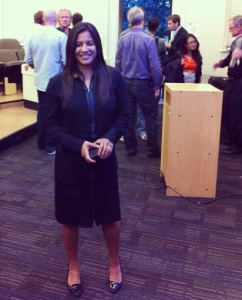
Reshma Sohoni, co-founder of startup incubator Seedcamp, the largest European startup incubator, spoke Monday at Stanford’s Entrepreneurship Week about Seedcamp and its role in the changing European startup and venture capital scene.
Seedcamp makes investments in startups from “Finland to Italy, Spain to Croatia, and Canada to Brazil” through the events it holds Europe. Seedcamp gives the 20 companies in which it invests annually access to its growing network of VC’s, lawyers, investors, consultants and other entrepreneurs. After the seed funding, the incubator provides mentoring to its companies, 200 so far.
With about 2,000 applications a year, Seedcamp accepts about 10 percent. Ninety percent of Seedcamp companies have further rounds of funding after their seed investment. Seedcamp companies have raised a total of $45 million from investors.
In choosing London as the center for Seedcamp, Sohoni said “London has all of the ingredients. Experienced entrepreneurs, angels, talent, and a diverse ecosystem.”
Silicon Valley thinkers such as Y-Combinator’s British-born founder Paul Graham have pointed out that Europeans have a negative perception of failing at business, which precludes Europeans from doing so. Sohoni dismissed this stigma as having largely gone away in the last five years.
London’s edge over other startup communities such a Berlin, and to a lesser degree Paris and Vienna, stems from the lack of a language barrier with the United States, Sohoni said. Addressing other European centers of entrepreneurship, Sohoni said that Berlin has the “cool factor” which London lacks, Paris is (and more so recently) too local and Vienna “though surprisingly active in the south,” is constricted by Austrian law. Barcelona-startups, which Sohoni did not mention until prompted by an audience member, are also local but tend to focus on the large market in Latin America, she said.
In Eastern Europe, Estonia has developed its own “Paypal mafia” through the Skype founders who funded four of the 20 venture capital investments made in that country in the last year. The Baltics also have a startup scene though it is extremely local.
Though Seedcamp encourages its companies to relocate to London, just as Y-Combinator requires its accepted founders to move to Silicon Valley, the startup scene there is still green and yet to been weened off American capital.
“The key limiters in picking up the pace are deal flow and quality of the companies,” Sohoni said. There is still “a learning curve” for Europeans eager to begin startups, likely a result of fewer European angel investors or other mentors who provide invaluable advice to founders. Additionally, she mentioned that it is difficult to get institutional capital, especially past the seed investment stage. Half of the post-seed rounds come from U.S. companies. As a result, Seedcamp companies have a “roadshow” during which they spend one week on the U.S. East Coast, one week in Silicon Valley, and to round up the roadshow, a trip to Microsoft, Amazon, Qualcomm, and finally Austin’s South by South West conference, which kicks off later this week.
Seedcamp, which launched in 2007, has joined forces with David McClure’s 500 Startups.
Even though Seedcamp is one of the driving forces behind the young and fast-growing European startup scene, Sohoni said, it still faces obstacles in talent, financing and knowledge, things which took decades to organically grow in Silicon Valley. European entrepreneurs who do not move to Silicon Valley are likely to continue to look to the United States for direction and money in the short-term.
Stanford Entrepreneurship Week 2012 takes place February 27 through March 7. This collection of over 30 events is hosted by the Stanford Entrepreneurship Network (SEN), a federation of programs, student groups and organizations supporting entrepreneurship in the Stanford community. For a complete listing of events check: https://sen.stanford.edu/e-week/calendardu/e-week/calendar
